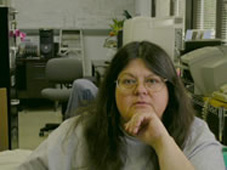Dr. Beverly A. Rzigalinski
The ScienceDaily article University Of Central Florida Researchers Find That Nanomaterials Developed For Industry Triple Or Quadruple Life Of Brain Cells said
“A molecular biologist and a nanoscientist at the University of Central Florida have found that nanomaterials developed for industry have an unexpected and potentially revolutionary side effect: They can triple or quadruple the life of brain cells.The result is people could live longer and with fewer age-related health problems.
Beverly Rzigalinski, assistant professor in the Department of Molecular Biology and Microbiology and at the Biomolecular Sciences Center, and Sudipta Seal, associate engineering professor at the Advanced Materials Processing and Analysis Center and the Department of Mechanical, Materials and Aerospace Engineering, will receive $1.4 million from the National Institutes of Health, National Institute on Aging to study the reasons behind the reaction and possible future applications.”
Beverly A. Rzigalinski, Ph.D. is a Professor of Pharmacology at VCOM and the director of NanoNeuro Laboratory and is known, by nickname, as Dr Z. She also has adjunct appointments in the Virginia-Maryland Regional College of Veterinary Medicine, Dept. of Biomedical Sciences and Pathobiology, and the Wake Forest Virginia Tech School of Biomedical Engineering. Her research interests are Nanobiology of Aging, Nanotechnology, Traumatic Brain Injury, and Brain Inflammation. She is on the Editorial Board of Nanotechnology, Science, and Applications.
Bev earned her undergraduate degree in Biochemistry from Rutgers University, New Brunswick, NJ. She earned her Master’s degree in Environmental Medicine from New York University. She ran her own environmental testing and mitigation firm, located in the New York metropolitan area. After selling the business, Bev completed her PhD at Eastern Virginia Medical School and Old Dominion University in 1990 with the thesis In situ regulation of cytosolic phospholipase Av(2).
She served as a post doc and assistant professor at the Medical College of Virginia, working in traumatic injury and neuronal, astrocyte, and microglial signaling. She conducted her research at the University of Central Florida, where she also taught Physiology & Endocrinology. She has published many papers in the field of neuroscience, traumatic injury, and nanotechnology and has received several awards in the field.
Bev authored Nanoparticles and Cell Longevity and coauthored Treatment of Neurodegenerative Disorders with Radical Nanomedicine, Traumatic Injury of Cortical Neurons Causes Changes in Intracellular Calcium Stores and Capacitative Calcium Influx, Reduction of Voltage-Dependent Mg2+ Blockade of NMDA Current in Mechanically Injured Neurons, and NMDA Receptor Activation Contributes to a Portion of the Decreased Mitochondrial Membrane Potential and Elevated Intracellular Free Calcium in Strain-Injured Neurons.
Read Radical Nanotechnology — How Medicine Can Learn From Materials Science.
